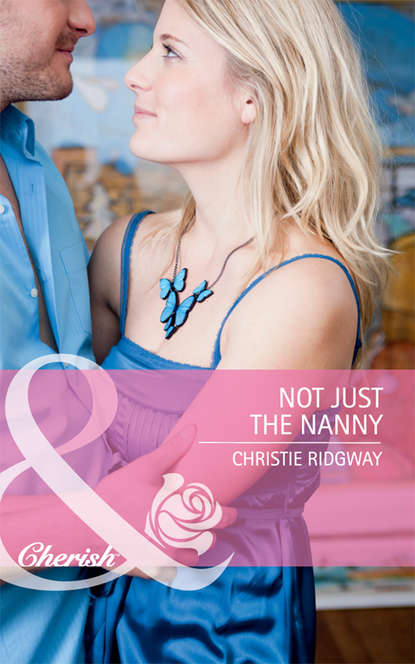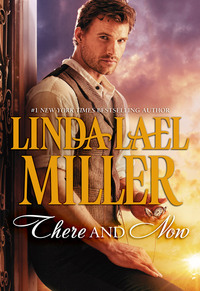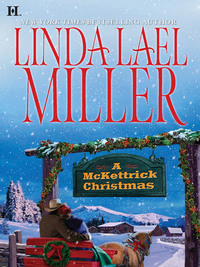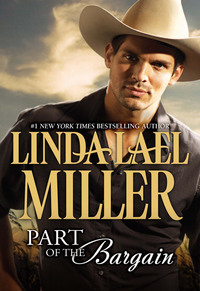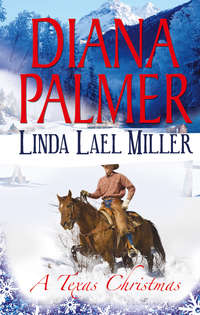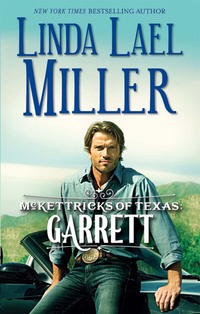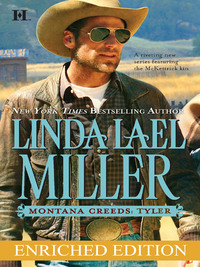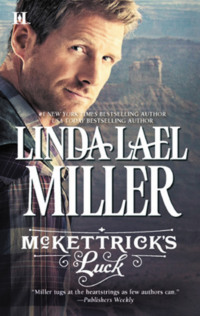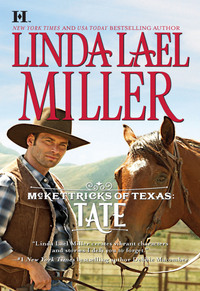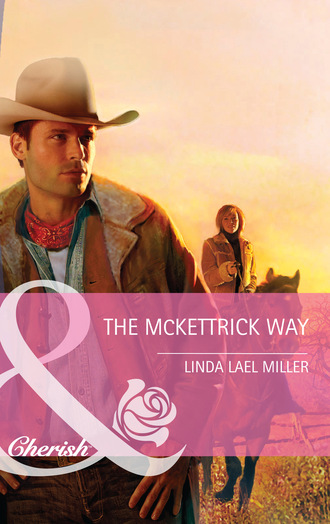
Полная версия
The Mckettrick Way
“Jesse told me.”
“And nobody thought to mention it to me?”
“I guess we assumed you’d talked to Brad.”
“Why would I do that?”
“Because—” Travis paused, looked uncomfortable. “It’s no secret that the two of you had a thing going, Meg. Indian Rock and Stone Creek are small places, forty miles apart. Things get around.”
Meg’s face burned. She’d thought, she’d truly believed, that no one on earth knew Brad had broken her heart. She’d pretended it didn’t matter that he’d left town so abruptly. Even laughed about it. Gone on to finish college, thrown herself into that first entry-level job at McKettrickCo. Dated other men, including the then-single Travis.
And she hadn’t fooled anyone.
“Are you going to see him again?”
Meg pressed the tips of her fingers hard into her closed eyes. Nodded. Then shook her head from side to side.
Travis chuckled. “Make a decision, Meg,” he said.
“We’re supposed to have a drink together tomorrow night, at a cowboy bar in Stone Creek. I don’t know why I said I’d meet him—after all this time, what do we have to say to each other?”
“‘How’ve ya been?’” Travis suggested.
“I know how he’s been—rich and famous, married twice, busy building a reputation that makes Jesse’s look tame,” she said. “I, on the other hand, have been a workaholic. Period.”
“Aren’t you being a little hard on yourself? Not to mention Brad?” A grin quirked the corner of Travis’s mouth. “Comparing him to Jesse?”
Jesse had been a wild man, if a good-hearted, well-intentioned one, until he’d met up with Cheyenne Bridges. When he’d fallen, he’d fallen hard, and for the duration, the way bad boys so often do.
“Maybe Brad’s changed,” Travis said.
“Maybe not,” Meg countered.
“Well, I guess you could leave town for a while. Stay out of his way.” Travis was trying hard not to smile. “Volunteer for a space mission or something.”
“I am not going to run,” Meg said. “I’ve always wanted to live right here, on this ranch, in this house. Besides, I intend to be here when the baby comes.”
Travis’s face softened at the mention of the impending birth. Until Sierra came along, Meg hadn’t thought he’d ever settle down. He’d had his share of demons to overcome, not the least of which was the tragic death of his younger brother. Travis had blamed himself for what happened to Brody. “Good,” he said. “But what do you actually do here? You’re used to the fast lane, Meg.”
“I take care of the horses,” she said.
“That takes, what—two hours a day? According to Eve, you spend most of your time in your pajamas. She thinks you’re depressed.”
“Well, I’m not,” Meg said. “I’m just—catching up on my rest.”
“Okay,” Travis said, drawing out the word.
“I’m not drinking alone and I’m not watching soap operas,” Meg said. “I’m vegging. It’s a concept my mother doesn’t understand.”
“She loves you, Meg. She’s worried. She’s not the enemy.”
“I wish she’d go back to Texas.”
“Wish away. She’s not going anywhere, with a grandchild coming.”
At least Eve hadn’t taken up residence on the ranch; that was some comfort. She lived in a small suite at the only hotel in Indian Rock, and kept herself busy shopping, day trading on her laptop and spoiling Liam.
Oh, yes. And nagging Meg.
Travis finished his coffee, carried his cup to the sink, rinsed it out. After hesitating for a few moments, he said, “It’s this thing about seeing Angus’s ghost. She thinks you’re obsessed.”
Meg made a soft, strangled sound of frustration.
“It’s not that she doesn’t believe you,” Travis added.
“She just thinks I’m a little crazy.”
“No,” Travis said. “Nobody thinks that.”
“But I should get a life, as the saying goes?”
“It would be a good idea, don’t you think?”
“Go home. Your pregnant wife needs a gallon of milk and a loaf of bread.”
Travis went to the door, put on his coat, took his hat from the hook. “What do you need, Meg? That’s the question.”
“Not Brad O’Ballivan, that’s for sure.”
Travis grinned again. Set his hat on his head and turned the doorknob. “Did I mention him?” he asked lightly.
Meg glared at him.
“See you,” Travis said. And then he was gone.
“He puts me in mind of that O’Ballivan fella,” Angus announced, nearly startling Meg out of her skin.
She turned to see him standing over by the china cabinet. Was it her imagination, or did he look a little older than he had that afternoon?
“Jesse looks like Jeb. Rance looks like Rafe. Keegan looks like Kade. You’re seeing things, Angus.”
“Have it your way,” Angus said.
Like any McKettrick had ever said that and meant it.
“What’s for supper?”
“What do you care? You never eat.”
“Neither do you. You’re starting to look like a bag of bones.”
“If I were you, I wouldn’t make comments about bones. Being dead and all, I mean.”
“The problem with you young people is, you have no respect for your elders.”
Meg sighed, got up from her chair at the table, stomped over to the refrigerator and selected a boxed dinner from the stack in the freezer. The box was coated with frost.
“I’m sorry,” Meg said. “Is that a hint of silver I see at your temples?”
Self-consciously, Angus shifted his weight from one booted foot to the other. “If I’m going gray,” he scowled, “it’s on account of you. None of my boys ever gave me half as much trouble as you, or my Katie, either. And they were plum full of the dickens, all of them.”
Meg’s heart pinched. Katie was Angus’s youngest child, and his only daughter. He rarely mentioned her, since she’d caused some kind of scandal by eloping on her wedding day—with someone other than the groom. Although she and Angus had eventually reconciled, he’d been on his deathbed at the time.
“I’m all right, Angus,” she told him. “You can go. Really.”
“You eat food that could be used to drive railroad spikes into hard ground. You don’t have a husband. You rattle around in this old house like some—ghost. I’m not leaving until I know you’ll be happy.”
“I’m happy now.”
Angus walked over to her, the heels of his boots thumping on the plank floor, took the frozen dinner out of her hands, and carried it to the trash compactor. Dropped it inside.
“Damn fool contraption,” he muttered.
“That was my supper,” Meg objected.
“Cook something,” Angus said. “Get out a skillet. Dump some lard into it. Fry up a chicken.” He paused, regarded her darkly. “You do know how to cook, don’t you?”
Chapter Three
Jolene’s, built on the site of the old saloon and brothel where Angus McKettrick and Major John Blackstone used to arm wrestle, among other things, was dimly lit and practically empty. Meg paused on the threshold, letting her eyes adjust and wishing she’d listened to her instincts and cancelled; now there would be no turning back.
Brad was standing by the jukebox, the colored lights flashing across the planes of his face. Having heard the door open, he turned his head slightly to acknowledge her arrival with a nod and a wisp of a grin.
“Where is everybody?” she asked. Except for the bartender, she and Brad were alone.
“Staying clear,” Brad said. “I promised a free concert in the high school gym if we could have Jolene’s to ourselves for a couple of hours.”
Meg nearly fled. If it hadn’t been against the McKettrick code, as inherent to her being as her DNA, she would have given in to the urge and called it good judgment.
“Have a seat,” Brad said, drawing back a chair at one of the tables. Nothing in the whole tavern matched, not even the bar stools, and every stick of furniture was scarred and scratched. Jolene’s was a hangout for honky-tonk angels; the winged variety would surely have given the place a wide berth.
“What’ll it be?” the bartender asked. He was a squat man, wearing a muscle shirt and a lot of tattoos. With his handlebar mustache, he might have been from Angus’s era, instead of the present day.
Brad ordered a cola as Meg forced herself across the room to take the chair he offered.
Maybe, she thought, as she asked for an iced tea, the rumors were true, and Brad was fresh out of rehab.
The bartender served the drinks and quietly left the saloon, via a back door.
Brad, meanwhile, turned his own chair around and sat astraddle it, with his arms resting across the back. He wore jeans, a white shirt open at the throat and boots, and if he hadn’t been so breathtakingly handsome, he’d have looked like any cowboy, in any number of scruffy little redneck bars scattered all over Arizona.
Meg eyed his drink, since doing that seemed slightly less dangerous than looking straight into his face, and when he chuckled, she felt her cheeks turn warm.
Pride made her meet his gaze. “What?” she asked, running damp palms along the thighs of her oldest pair of jeans. She’d made a point of not dressing up for the encounter—no perfume, and only a little mascara and lip gloss. War paint, Angus called it. Her favorite ghost had an opinion on everything, it seemed, but at least he’d honored his promise not to horn in on this interlude, or whatever it was, with Brad.
“Don’t believe everything you read,” Brad said easily, settling back in his chair. “Not about me, anyway.”
“Who says I’ve been reading about you?”
“Come on, Meg. You expected me to drink Jack Daniel’s straight from the bottle. That’s hype—part of the bad-boy image. My manager cooked it up.”
Meg huffed out a sigh. “You haven’t been to rehab?”
He grinned. “Nope. Never trashed a hotel room, spent a weekend in jail, or any of the rest of the stuff Phil wanted everybody to believe about me.”
“Really?”
“Really.” Brad pushed back his chair, returned to the jukebox, and dropped a few coins in the slot. An old Johnny Cash ballad poured softly into the otherwise silent bar.
Meg took a swig of her iced tea, in a vain effort to steady her nerves. She was no teetotaler, but when she drove, she didn’t drink. Ever. Right about then, though, she wished she’d hired a car and driver so she could get sloshed enough to forget that being alone with Brad O’Ballivan was like having her most sensitive nerves bared to a cold wind.
He started in her direction, then stopped in the middle of the floor, which was strewn with sawdust and peanut shells. Held out a hand to her.
Meg went to him, just the way she’d gone to the Dixie Dog Drive-In the day before. Automatically.
He drew her into his arms, holding her close but easy, and they danced without moving their feet.
As the song ended, Brad propped his chin on top of Meg’s head and sighed. “I’ve missed you,” he said.
Meg came to her senses.
Finally.
She pulled back far enough to look up into his face.
“Don’t go there,” she warned.
“We can’t just pretend the past didn’t happen, Meg,” he reasoned quietly.
“Yes, we can,” she argued. “Millions of people do it, every day. It’s called denial, and it has its place in the scheme of things.”
“Still a McKettrick,” Brad said, sorrow lurking behind the humor in his blue eyes. “If I said the moon was round, you’d call it square.”
She poked at his chest with an index finger. “Still an O’Ballivan,” she accused. “Thinking you’ve got to explain the shape of the moon, as if I couldn’t see it for myself.”
The jukebox in Jolene’s was an antique; it still played 45s, instead of CDs. Now a record flopped audibly onto the turntable, and the needle scratched its way into Willie Nelson’s version of “Georgia.”
Meg stiffened, wanting to pull away.
Brad’s arms, resting loosely around her waist, tightened slightly.
Over the years, the McKettricks and the O’Ballivans, owning the two biggest ranches in the area, had been friendly rivals. The families were equally proud and equally stubborn—they’d had to be, to survive the ups and downs of raising cattle for more than a century. Even when they were close, Meg and Brad had always identified strongly with their heritages.
Meg swallowed. “Why did you come back?” she asked, without intending to speak at all.
“To settle some things,” Brad answered. They were swaying to the music again, though the soles of their boots were still rooted to the floor. “And you’re at the top of my list, Meg McKettrick.”
“You’re at the top of mine, too,” Meg retorted. “But I don’t think we’re talking about the same kind of list.”
He laughed. God, how she’d missed that sound. How she’d missed the heat and substance of him, and the sun-dried laundry smell of his skin and hair…
Stop, she told herself. She was acting like some smitten fan or something.
“You bought me an engagement ring,” she blurted, without intending to do anything of the kind. “We were supposed to elope. And then you got on a bus and went to Nashville and married what’s-her-name!”
“I was stupid,” Brad said. “And scared.”
“No,” Meg replied, fighting back furious tears. “You were ambitious. And of course the bride’s father owned a recording company—”
Brad closed his eyes for a moment. A muscle bunched in his cheek. “Valerie,” he said miserably. “Her name was Valerie.”
“Do you really think I give a damn what her name was?”
“Yeah,” he answered. “I do.”
“Well, you’re wrong!”
“That must be why you look like you want to club me to the ground with the nearest blunt object.”
“I got over you like that!” Meg told him, snapping her fingers. But a tear slipped down her cheek, spoiling the whole effect.
Brad brushed it away gently with the side of one thumb. “Meg,” he said. “I’m so sorry.”
“Oh, that changes everything!” Meg scoffed. She tried to move away from him again, but he still wouldn’t let her go.
One corner of his mouth tilted up in a forlorn effort at a grin. “You’ll feel a lot better if you forgive me.” He curved the fingers of his right hand under her chin, lifted. “For old times’ sake?” he cajoled. “For the nights when we went skinny-dipping in the pond behind your house on the Triple M? For the nights we—”
“No,” Meg interrupted, fairly smothering as the memories wrapped themselves around her. “You don’t deserve to be forgiven.”
“You’re right,” Brad agreed. “I don’t. But that’s the thing about forgiveness. It’s all about grace, isn’t it? It’s supposed to be undeserved.”
“Great logic if you’re on the receiving end!”
“I had my reasons, Meg.”
“Yeah. You wanted bright lights and big money. Oh, and fast women.”
Brad’s jaw tightened, but his eyes were bleak. “I couldn’t have married you, Meg.”
“Pardon my confusion. You gave me an engagement ring and proposed!”
“I wasn’t thinking.” He looked away, faced her again with visible effort. “You had a trust fund. I had a mortgage and a pile of bills. I laid awake nights, sweating blood, thinking the bank would foreclose at any minute. I couldn’t dump that in your lap.”
Meg’s mouth dropped open. She’d known the O’Ballivans weren’t rich, at least, not like the McKettricks were, but she’d never imagined, even once, that Stone Creek Ranch was in danger of being lost.
“They wanted that land,” Brad went on. “The bankers, I mean. They already had the plans drawn up for a housing development.”
“I didn’t know—I would have helped—”
“Sure,” Brad said. “You’d have helped. And I’d never have been able to look you in the face again. I had one chance, Meg. Valerie’s dad had heard my demo and he was willing to give me an audition. A fifteen-minute slot in his busy day. I tried to tell you—”
Meg closed her eyes for a moment, remembering. Brad had told her he wanted to postpone the wedding until after his trip to Nashville. He’d promised to come back for her. She’d been furious and hurt—and keeping a secret of her own—and they’d argued….
She swallowed painfully. “You didn’t call. You didn’t write—”
“When I got to Nashville, I had a used bus ticket and a guitar. If I’d called, it would have been collect, and I wasn’t about to do that. I started half a dozen letters, but they all sounded like the lyrics to bad songs. I went to the library a couple of times, to send you an e-mail, but beyond ‘how are you?’ I just flat-out didn’t know what to say.”
“So you just hooked up with Valerie?”
“It wasn’t like that.”
“I’m assuming she was a rich kid, just like me? I guess you didn’t mind if she saved the old homestead with a chunk of her trust fund.”
Brad’s jawline tightened. “I saved the ranch,” he said. “Most of the money from my first record contract went to paying down the mortgage, and it was still a struggle until I scored a major hit.” He paused, obviously remembering the much leaner days before he could fill the biggest stadiums in the country with devoted fans, swaying to his music in the darkness, holding flickering lighters aloft in tribute. “I didn’t love Valerie, and she didn’t love me. She was a rich kid, all right. Spoiled and lonesome, neglected in the ways rich kids so often are, and she was in big trouble. She’d gotten herself pregnant by some married guy who wanted nothing to do with her. She figured her dad would kill her if he found out, and given his temper, I tended to agree. So I married her.”
Meg made her way back to the table and sank into her chair. “There was…a baby?”
“She miscarried. We divorced amicably, after trying to make it work for a couple of years. She’s married to a dentist now, and really happy. Four kids, at last count.” Brad joined Meg at the table. “Do you want to hear about the second marriage?”
“I don’t think I’m up to that,” Meg said weakly.
Brad’s hand closed over hers. “Me, either,” he replied. He ducked his head, in a familiar way that tugged at Meg’s heart, to catch her eye. “You all right?”
“Just a little shaken up, that’s all.”
“How about some supper?”
“They serve supper here? At Jolene’s?”
Brad chuckled. “Down the road, at the Steakhouse. You can’t miss it—it’s right next to the sign that says, Welcome To Stone Creek, Arizona, Home Of Brad O’Ballivan.”
“Braggart,” Meg said, grateful that the conversation had taken a lighter turn.
He grinned engagingly. “Stone Creek has always been the home of Brad O’Ballivan,” he said. “It just seems to mean more now than it did when I left that first time.”
“You’ll be mobbed,” Meg warned.
“The whole town could show up at the Steakhouse, and it wouldn’t be enough to make a mob.”
“Okay,” Meg agreed. “But you’re buying.”
Brad laughed. “Fair enough,” he said.
Then he got up from his chair and summoned the bartender, who’d evidently been cooling his heels in a storeroom or office.
The floor felt oddly spongy beneath Meg’s feet, and she was light-headed enough to wonder if there’d been some alcohol in that iced tea after all.
The Steakhouse, unlike Jolene’s, was jumping. People called out to Brad when he came in, and young girls pointed and giggled, but most of them had been at the welcome party Ashley and Melissa had thrown for him on the ranch the night before, so some of the novelty of his being back in town had worn off.
Meg drew some glances, though—all of them admiring, with varying degrees of curiosity mixed in. Even in jeans, boots and a plain woolen coat over a white blouse, she looked like what she was—a McKettrick with a trust fund and an impressive track record as a top-level executive. When McKettrickCo had gone public, Brad had been surprised when she didn’t turn up immediately as the CEO of some corporation. Instead, she’d come home to hibernate on the Triple M, and he wondered why.
He wondered lots of things about Meg McKettrick.
With luck, he’d have a chance to find out everything he wanted to know.
Like whether she still laughed in her sleep and ate cereal with yogurt instead of milk and arched her back like a gymnast when she climaxed.
Since the Steakhouse was no place to think about Meg having one of her noisy orgasms, Brad tried to put the image out of his mind. It merely shifted to another part of his anatomy.
They were shown to a booth right away, and given menus and glasses of water with the obligatory slices of fresh lemon rafting on top of the ice.
Brad ordered a steak, Meg a Caesar salad.
The waitress went away, albeit reluctantly.
“Okay,” Brad said, “it’s my turn to ask questions. Why did you quit working after you left McKettrickCo?”
Meg smiled, but she looked a little flushed, and he could tell by her eyes that she was busy in there, sorting things and putting them in their proper places. “I didn’t need the money. And I’ve always wanted to live full-time on the Triple M, like Jesse and Rance and Keegan. When I spent summers there, as a child, the only way I could deal with leaving in the fall to go back to school was to promise myself that one day I’d come home to stay.”
“You love it that much?” Given his own attachment to Stone Creek Ranch, Brad could understand, but at the same time, the knowledge troubled him a little, too. “What do you do all day?”
Her mouth quirked in a way that made Brad want to kiss her. And do a few other things, too. “You sound like my mother,” she said. “I take care of the horses, ride sometimes—”
He nodded. Waited.
She didn’t finish the sentence.
“You never married.” He hadn’t meant to say that. Hadn’t meant to let on that he’d kept track of her all these years, mostly on the Internet, but through his sisters, too.
She shook her head. “Almost,” she said. “Once. It didn’t work out.”
Brad leaned forward, intrigued and feeling pretty damn territorial, too. “Who was the unlucky guy? He must have been a real jackass.”
“You,” she replied sweetly, and then laughed at the expression on his face.
He started to speak, then gulped the words down, sure they’d come out sounding as stupid as the question he’d just asked.
“I’ve dated a lot of men,” Meg said.
The orgasm image returned, but this time, he wasn’t Meg’s partner. It was some other guy bringing her to one of her long, exquisite, clawing, shouting, bucking climaxes, not him. He frowned.
“Maybe we shouldn’t talk about my love life,” she suggested.
“Maybe not,” Brad agreed.
“Not that I exactly have one.”
Brad felt immeasurably better. “That makes two of us.”
Meg looked unconvinced. Even squirmed a little on the vinyl seat.
“What?” Brad prompted, enjoying the play of emotions on her face. He and Meg weren’t on good terms—too soon for that—but it was a hopeful sign that she’d met him at Jolene’s and then agreed to supper on top of it.
“I saw that article in People magazine. ‘The Cowboy with the Most Notches on His Bedpost,’ I think it was called?”
“I thought we weren’t going to talk about our love lives. And would you mind keeping your voice down?”
“We agreed not to talk about mine, if I remember correctly, which, as I told you, is nonexistent. And to avoid the subject of your second wife—at least, for now.”
“There have been women,” Brad said. “But that bedpost thing was all Phil’s idea. Publicity stuff.”
The food arrived.
“Not that I care if you carve notches on your bedpost,” Meg said decisively, once the waitress had left again.
“Right,” Brad replied, serious on the outside, grinning on the inside.
“Where is this Phil person from, anyway?” Meg asked, mildly disgruntled, her fork poised in midair over her salad. “Seems to me he has a pretty skewed idea on the whole cowboy mystique. Rehab. Trashing hotel rooms. The notch thing.”
“There’s a ‘cowboy mystique’?”
“You know there is. Honor, integrity, courage—those are the things being a cowboy is all about.”


